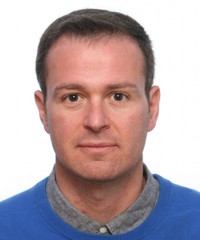Acceder con tu cuenta UGR
Te permite iniciar tu sesión con tus credenciales de la Universidad de GranadaAccede para:
- Actualizar Curriculum
- Editar Investigación
- Modificar Otros Datos
- Actualizar Redes Sociales
Miguel Ángel Galindo Cuesta
|
PROFESOR TITULAR DE UNIVERSIDAD
Departamento de Química Inorgánica |
|---|
| Facultad de Ciencias |
| Avenida de Fuentenueva S/N C.P. 18071 (Granada) Granada |
| 958248525 |
| Ver |
| Importar contacto |
HORARIO DE TUTORÍAS
| Día de la semana | Horario | Lugar |
|---|---|---|
| Martes | 10:00-12:00 | Ciencias, Química I, Planta2. Despacho1 |
| Miércoles | 10:00-12:00 | Ciencias, Química I, Planta2. Despacho1 |
| Jueves | 10:00-12:00 | Ciencias, Química I, Planta2. Despacho1 |
GRADUADO/A EN MATEMÁTICAS Y FÍSICA
GRADUADO/A EN FÍSICA
MÁSTER UNIVERSITARIO EN PROFESORADO DE ENSEÑANZA SECUNDARIA OBLIGATORIA Y BACHILLERATO, FORMACIÓN PROFESIONAL Y ENSEÑANZAS DE IDIOMAS (FÍSICA Y QUÍMICA) DOBLE TITULACIÓN: MAES+KHEMIA
MÁSTER UNIVERSITARIO EN CIENCIAS Y TECNOLOGÍAS QUÍMICAS, KHEMIA
- METODOLOGIA E INSTRUMENTACIÓN - CARACTERIZACIÓN DE COMPUESTOS DE COORDINACIÓN
- METODOLOGIA E INSTRUMENTACIÓN - CARACTERIZACIÓN DE COMPUESTOS DE COORDINACIÓN
MÁSTER UNIVERSITARIO EN PROFESORADO DE ENSEÑANZA SECUNDARIA OBLIGATORIA Y BACHILLERATO, FORMACIÓN PROFESIONAL Y ENSEÑANZAS DE IDIOMAS
Personal Website: https://wpd.ugr.es/~magalindo/wordpress/
Dr. Galindo's research focuses on the development of hybrid metal-DNA systems that could find applications in nanoscience. DNA molecules are customized with artificial nucleobases to guide the interaction of metal ions towards Watson-Crick positions, where natural hydrogen bonds are replaced by metal ions. Thus, DNA systems are obtained that are capable of self-assembling naturally, and that can later incorporate continuous arrays of metallic entities inside. These metal ions can bring new properties to these DNA molecules, such as luminescence, conductivity, catalytic capacity and/or cytotoxicity.
Dr Galindo is an Associated Professor at Universidad de Granada (UGR) since December 2017. He completed his PhD with a National Research Grant (FPI) in the Department of Inorganic Chemistry at UGR under the supervision of Prof. Maria Angustias Romero and Prof. José A. Rodriguez Navarro, and obtained his PhD in July 2006 (outstanding Cum Laude and European Mention). During his PhD, he researched the design, synthesis, characterization and study of properties of metallocalixarene as molecular receptors, their use as biosensors and their interaction towards DNA.
Afterwards, he started a postdoctoral position in the Chemical Nanoscience Laboratory group of Prof. Andrew Houlton (Newcastle University, UK). The objective of the research work was to study the interaction of metal ions towards DNA nucleobases, as well as their use for the formation of complex supramolecular associations. During this time, he also started to research on DNA-based materials which led him to prepare a multidisciplinary research project that was awarded a Marie Curie IEF-FP7 grant. Subsequently, he was hired at Newcastle University as Research Associated to work on a multidisciplinary project (Large Area Molecular-assembled Nanoscale Devices) funded by the program Nanosciences, Nanotechnologies, Materials and new Production Technologies EU-FP7.
Next, Dr. Galindo obtained a Marie Curie RG-FP7 Reincorporation Research Project to start his independent research career in the department of Inorganic Chemistry of UGR. Since them, Dr Galindo developed a new research line that focuses on the development of “hybrid metal-DNA systems with potential applications in nanoscience”, which had little presence in Spain, and become the Principal Investigator of different research project, including National Spanish Ministry, regional funding body (Junta de Andalucía), and local UGR-FEDER projects.
In addition to seeking financing to develop his line of research, Dr Galindo has also obtained financing for the acquisition of new equipment that allows him to develop his scientific activity, obtaining two projects from the national infrastructure plan for the acquisition of a 600Mhz NMR equipment (Bruker) and an AFM (Park NX-20) equipped with modules for the study and characterization of nanomaterials.
Dr Galindo has always wanted an international projection of his research, in order to promote the transfer of knowledge between research groups. In this regard, he enjoyed a mobility grant in the Spanish National ¿Salvador Madariaga Program¿ to work in Prof. May Nyman's group (Oregon State University, USA) where he used Small angle X-ray scattering measurements to study his DNA-based nanomaterials. He has also secured a project from the European Research Infrastructure Consortium (CERIC-ERIC) to use the Slovenian NMR Center, where he currently works with Prof. Janez Plavec on the characterization of DNA materials by NMR spectroscopy.
Personal Website: https://wpd.ugr.es/~magalindo/wordpress/
